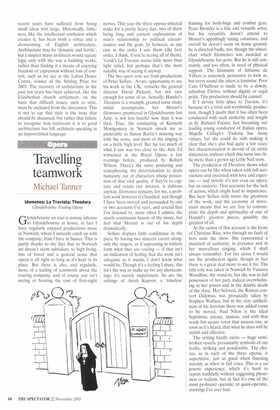Travelling teamwork
Michael Tanner
ldomeneo; La Traviata; Theodora Glyndebourne Touring Opera Cllyndebourne on tour is nowise inferior to Glyndebourne at home, in fact I have regularly enjoyed productions more in Norwich, where I annually catch up with the company, than I have in Sussex. That is partly thanks to the fact that in Norwich art doesn't seem subsidiary to high living, lots of travel and a general sense that opera is all right so long as it's kept in its place. But there is also, and regularly, more of a feeling of teamwork about the touring company, and of course one isn't seeing or hearing the cost of first-night nerves. This year the three operas selected make for a pretty heavy diet, two of them being long and earnest explorations of man's relationship to political circumstances and the gods. In between, at any rate in the order I saw them (the best order, I think, if you're seeing all of them), Verdi's La Traviata seems little more than light relief, but perhaps that's the most suitable way of seeing it anyway.
The two opera serie are both productions of Peter Sellars. 'A rare opportunity to see his work in the UK,' remarks the general director David Pickard; but not rare enough for some of us. Actually, Handel's Theodora is a triumph, granted some shaky initial assumptions, but Mozart's Idomeneo, premiered in Glyndebourne last June, is not less hateful now than it was then. True, the conducting of Kenneth Montgomery in Norwich struck me as preferable to Simon Rattle's mincing way with the score, and most of the singing is on a fairly high level. But far too much of what I saw was too close to the Aida I'd witnessed at the Royal Opera a few evenings before, produced by Robert Wilson. There's the same posturing and semaphoring, the determination to drain humanity out of characters whose possession of that vital quality, if they're to capture and retain our interest, is dubious anyway. ldomeneo remains, for me, a problem work however it's handled, and though I have been moved and persuaded by one or two accounts I've seen, and several that I've listened to, more often I admire the nearly continuous beauty of the music, but feel that Mozart is out of his depth dramatically.
Sellars displays little confidence in the piece by having two dancers cavort alongside the singers, as if expressing in balletic form what they are voicing — if that isn't an indication of feeling that the work isn't adequate as it stands, I don't know what would be. Though it's a feeling I share, this isn't the way to make up for any shortcomings; it's merely impertinent. So are the settings of Anish Kapoor, a 'timeless' framing for body-bags and combat gear. Peter Bronder is a fine and versatile artist, but his versatility doesn't extend to Mozart's appallingly taxing coloratura, and overall he doesn't seem on home ground; he is directed badly, too, though the wheelchair which Idomeneo was awarded at Glyndebourne has gone. But he is still constantly, and too often, in need of physical support. The Idamante of Julianne de Villiers is extremely persuasive to look at, but every sound she utters is feminine. Poor Cara O'Sullivan is made to be a dowdy, suburban Elettra, without dignity or regal pride. This production should be canned.
If I devote little space to Traviata, it's because it's a tried and worthwhile production, though I doubt that it has often been conducted with such authority and insight as by Richard Fames, fast becoming our leading young conductor of Italian opera. Majella Cullagh's Violetta has many virtues, but she could do with making it clear that she's also had quite a few vices: her characterisation is devoid of an erotic dimension, without which this turns into little more than a grown-up Little Nell story.
The production of Theodora shows what opera can be like when taken with full seriousness and executed with love and expertise — and strictly it's not even an opera, but an oratorio. That accounts for the lack of action, which might lead to impatience. But here Sellars fully trusts the greatness of the work, and the economy of movement means that we are free to contemplate the depth and spirituality of one of Handel's greatest pieces, possibly the greatest of all.
At the centre of this account is the Irene of Christine Rice, who through no fault of hers stole the show. She represented a standard of authority, in presence and in her marvellous singing, which I shall always remember. For her alone I would see the production again, though in fact there is a great deal more to see it for. The title role was taken in Norwich by Vanessa Woodfine, the stand-in, but she was in full possession of her part, indeed overwhelming in her prison and in the double death of the close. Her beloved, the Roman convert Didymus, was prosaically taken by Stephen Wallace, but in the very unlikeliness of his heroism there was added room to be moved. Paul Nilon is the ideal Septimius, uneasy, anxious, and with that reedy but secure tenor that assures one, as soon as it's heard, that what he does will be stylish and effective.
The setting hardly exists — huge semibroken vessels, presumably symbolic of our frailty, striking and ponderable. The chorus, as in each of the three operas, is superlative, just as good when listening intently as when in full voice. This is a sui generis experience, which it's hard to report truthfully without suggesting phoniness or tedium, but in fact it's one of the most profound operatic, or quasi-operatic, evenings I've ever had.


























































































 Previous page
Previous page